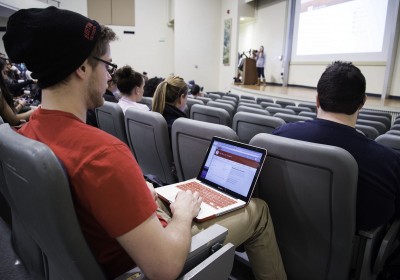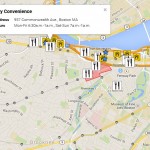
The Boston University Student Activities Office will launch a new online platform Monday using OrgSync, a club management tool, replacing its current system, YouDo.
On Saturday and Sunday, SAO staff trained over 1,000 students in the Residence Hall Association, Student Government and other undergraduate and graduate groups to prepare student leaders for the site launch. The new program is intended to provide a more cohesive and efficient way for student groups at Boston University to organize, said SAO Coordinator of Programs Taylor Sevigny.
“We did a lot of testing. We were on the phone almost everyday trying to figure out how this product would work with our campus and if we could make significant adjustments to our old process to improve it,” he said.
Compared to SAO’s current YouDo system, OrgSync can be used to create and plan club events, request and manage funds from the Allocations Board and communicate with SAO and club members more easily, Sevigny said. The platform also has a mobile-friendly site and an iPhone app.
“We’re incorporating all of our university partners in the system too so that they know what’s going on around campus,” he said.
SAO’s goal in using OrgSync is to make the event-planning process simpler for students, including taking fewer trips to the SAO office, Sevigny said. The process will include an event request form with room reservation info and the ability to email forms to advisors for digital signatures instead of having to track them down.
OrgSync is used by over 400 campuses worldwide. In Massachusetts alone, 10 different campuses, including Northeastern University and Boston College, use the platform, according to OrgSync’s website.
At the training sessions, SAO’s Associate Director Abby Myette said the biggest change that comes along with the OrgSync platform is the eventual elimination of physical paperwork. Students in attendance responded with cheers and applause.
“This is the next really big leap making things easier for all of you,” she said.
Student organizations have until Feb. 9 to complete any outstanding physical paperwork before SAO becomes online-only, Myette said. After that date, paperwork will no longer be accepted.
Several student leaders said learning how to use OrgSync will take time, but they are happy to see changes that will making running their groups easier.
Laurel Greenfield, a contributor for Spoon University, said the transition to OrgSync should not be too difficult to adjust to.
“It’s a long process, but I understand. It’s going in the right direction,” said Greenfield, a graduate student in the Metropolitan College. “It’s kind of like BU Facebook, which is good because people are familiar with how to use that.”
Gabby Aiosa-Perrin, the secretary for Psi Chi, the National Honor Society in psychology, said the transition may be difficult for groups with many members, but she welcomes the change.
“It’s going to take a long time, and the online forms are going to take some time to get used to,” said Aiosa-Perrin, a senior in the College of Arts and Sciences. “Not having to go in if we don’t want to will definitely help.”
Chelsea Higgins , president of the Global Medical Brigades, said students are going to need more outside help to learn about everything OrgSync has to offer.
“[There’s] specific details with off-campus event forms and signature sheets, and how that’s going to work via the web,” said Higgins, a CAS junior. “It’s something to adapt to.”
Ryan Melendez, vice president of Christians on Campus, said the program was a bit overwhelming at first, but he is glad SAO provided materials to help answer questions.
“I would have been completely lost without the videos and hands-on explanations,” said Melendez, a sophomore in CAS. “The navigation away from paper documents and having everything online will be a big improvement.”














